Peter Pan
Back to Home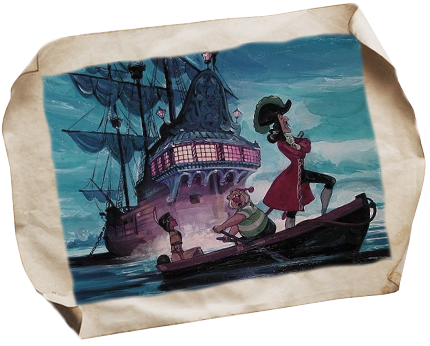

In this review of a 1987 revival production of Peter Pan, John Bemrose examines the prevailing fascination with Barrie's character and his exploits. The critic terms the playwright's tale as timeless and, of this production, states "this Peter Pan generates magic" and "compels belief."
Peter Pan, the boy who refused to grow up, has flourished in the hearts of children and adults since he first took flight 83 years ago. The stage and book versions, written by Englishman J.M. Barrie, have never been entirely out of fashion. But now a new generation is learning to love Peter Pan—and his struggle with the villainous Captain Hook. For many Canadians, the highwater mark of the current revival is the Shaw Festival’s spectacular production at Niagara-on-the-Lake, Ont., which opened August 14. But publishers, too, have been getting in on the action. Montreal’s Tundra Books has just released The Eternal Peter Pan, the first volume of a trilogy of Pan-related books. As well, the rights to Barrie’s drama and novel, now held by a London children’s hospital, become public next year—giving added momentum to rumors that Hollywood director Steven Spielberg is planning a film version starring Michael Jackson. It all confirms Barrie’s genius in finding a theme that has caught the imagination of four generations.
Peter Pan has seen the writing on the wall—the dull jobs and bored faces of so many grown-ups—and
he wants no part of it. In the book version, his quixotic revolt is frequently overburdened
by Barrie’s ponderous commentary. But the play sticks economically to the story line, a
virtue wonderfully enhanced by the Shaw’s magnetic production. Its Peter Pan has more gusto
than an old Errol Flynn adventure film. It also has the nerve to look into the darker
corners of Barrie’s vision—his references to death and the sadness of growing old—from which
more saccharine versions, from Broadway and Hollywood, have tiptoed away.
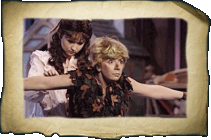 Most important, this Peter Pan generates magic—the result of a successful melding of astounding
technical effects and oldfashioned acting skill. Only the most thoroughgoing cynic would be
bothered by a glimpse of the wires holding up Peter and his fellow fliers:
this Peter Pan compels belief.
Most important, this Peter Pan generates magic—the result of a successful melding of astounding
technical effects and oldfashioned acting skill. Only the most thoroughgoing cynic would be
bothered by a glimpse of the wires holding up Peter and his fellow fliers:
this Peter Pan compels belief.
In the past the roles of Peter and his band of followers, the Lost Boys, have frequently been played by mature actresses. Other versions have featured children in those parts. But director Ian Judge has opted for an all-adult cast of both sexes, a tack that simultaneously ensures strong acting and infectious comedy. To watch Ted Dykstra as the toddler Michael Darling, hugging his Teddy Bear and moving about on all fours, is to be struck by both the latent infantilism of adults and the charm of children.
When Michael and his two siblings fly to Never-Never Land, where Wendy (Marti Maraden) is to take care of Peter’s tribe of orphans, the audience gets its first glimpse of designer Cameron Porteous’s wizardry. Not only do Peter (Tom McCamus) and the Darling children levitate; their beds do too, turning into clouds as the miniature lamplit city of London revolves below.
The technical sleight of hand, however, never overwhelms Barrie’s attempts to reveal the world of the imagination—Peter’s kingdom. It is a place where evil men are more comic than dangerous. The Shaw’s artistic director, Christopher Newton, returns to the stage as a deliciously frightening Captain Hook, swaggering, sulking and muttering dark piratical oaths ("Bicarbonate of soda!") with relish.
As the hero, McCamus is at once ethereal and boyish. He also has just the right touch of coldness. Peter, after all, is not human like the others. He can remain a child forever, but in his immortality he can never know what it is to have a fully human heart.
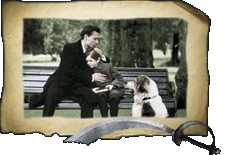
The following essay is written by a fan, Samantha-Ellen, via her BlogSpot. It is a beautifully written article about why she loves Peter Pan, and what it means to her. She mentions both the book and the 2003 movie of Peter Pan in this essay.
I went and bought a copy of Peter Pan the other week, because despite it being just about my favourite book ever, I actually did not own a proper copy. And by proper, I mean the actual text by Barrie, and not some re-imagined or rehashed or condensed version, because despite the pretty pictures, these versions just can’t come close to the real thing.
Why do I love this book? What is it about Peter and Hook and Tink and the Neverlands that makes
me feel so awed and anguished all at once? Sure, I think Barrie has a way with words that
completely captivates – a rollicking pace, sly wit, moments of reflection or sadness immediately
offset with humour and action so the story, like Peter, immediately darts off in a new and exciting
direction.
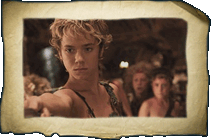 Barrie’s narrative voice is excellent – knowing, interested in words, always considerate
of the reader, engaging.
Barrie’s narrative voice is excellent – knowing, interested in words, always considerate
of the reader, engaging.
And sure, there is the appeal of running away and never growing up, and playing at adventure and derring-do without any thought for what you have to do with the rest of your life, and then settling for something sub-par anyway (as Barrie, quite poignantly, points out is the case with Mr Darling). There is the glorious nature of the vivacity and cockiness of youth, the blossoming of imagination, of believing things like flying and mermaids and skirmishes with pirates and living in a house in the roots of a tree is not only possible, but also such grand fun. All this is attractive, and captured so piquantly in Peter, this spirited little boy with his leaf and vine clothes and obnoxious crowing and baby teeth, so full of recklessness and excitement and devastating naivety. Barrie writes of Peter Pan that 'no women has ever yet been able to resist and I think this is true of most children, and even adults as well. But still, this is not why I adore Peter Pan.
At its heart there are the nuances of loneliness and disappointment, driving Peter ever on in his
quest for eternal youth, and many of the other characters as well.
Life is disappointing. We know this. For every shining moment when you just want to burst because
everything has gone right, there are about ten disappointments that precede it. To make things
attainable, to allow for reality, you often have to put aside other things, including, as Mr. and
Mrs. Darling know, dreams and hopes and wishes. Often other dreams take their place, and often we
make the most of and come to love what we do have instead. But it is that moment when you first
make that revelation, when you realise that second-best is as good as it’s going to get, that is
so sad and tragic and unfair.
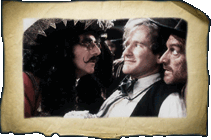 This subtle, horrible trickling of reality into our dreams and how
it affects how we understand the world is really what I think Peter Pan is about: the first contact
with the childish mind and the way it continues to resonate well into adulthood.
This subtle, horrible trickling of reality into our dreams and how
it affects how we understand the world is really what I think Peter Pan is about: the first contact
with the childish mind and the way it continues to resonate well into adulthood.
Peter Pan asks that niggling, aching question of 'what if.' What if we never grew up? Growing up is exciting, but once you get there you really only want to go back. Wendy does. The Lost Boys, once they become lawyers and office-workers, they do to. Hook is a particularly fascinating case study – Barrie hints that he endured a miserable childhood and realities came rushing in much sooner than most. Hook has grown up, but he is still trapped in the hurts and woes of his childhood, and by pitting himself against Peter he is pitting himself against all the unfairness of his lost youth. At heart Hook is still a boy, dealing out retribution to all those who made him so miserable. Take that – he is a pirate, roaming the seas, living out adventures and mastering epic deeds. But, unlike Peter, he can distinguish between reality and make-believe, and he knows it is all pretence. Peter can brush off consequence and disappointment, Hook cannot. His body is aging but his mind is getting left behind, and he will fail where Peter will always emerge triumphant.
That this is where he wins us over, and why he has become such an illustrious
villain. He, too, is a victim of disappointment.
Barrie writes joyously of his characters, but he can also be quite perceptively cruel. He
variously condemns Mr. Darling for being pretentious and pandering, Mrs. Darling for being a
slave to her children and having 'no proper spirit,' Wendy for being frivolous, Michael and
John for being silly and cold-hearted. His observations of the Lost Boys make fun of them as
much as they celebrate all the boys’ quirks. Not even Peter escapes Barrie’s occasional snarky
asides. As a technical device this is quite successful, because it invites confidence in Barrie
as the authorial voice, establishing intimacy and making us feel like we have one up on the
characters, or know something about them that they do not.
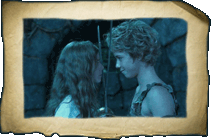 But it also gives us realistic,
well-rounded characters, that not only make for great social commentary but also embellishes
them with little niches or faults that cut into us and inevitably leave their mark.
But it also gives us realistic,
well-rounded characters, that not only make for great social commentary but also embellishes
them with little niches or faults that cut into us and inevitably leave their mark.
Perhaps what I love most about Peter Pan, and what I think was done just so perfectly with the 2003 movie, is the relationship between him and Wendy. They are, I think, made for each other. What is so tragic is that they never get the chance to develop this beyond those intoxicating first stages. Wendy is the only one that would perhaps make 'growing up' worthwhile, but, like the best romances, the cost is too high. And really, I think that’s how it should be. They will always be kids playing at pretending to be adults, their relationship will always have the loveliness of possibility, always be caught in that exquisite netherworld of dreams and make-believe. I think this is beautiful - but I am a sucker for a tragic ending. These are the ones that stay with me long after the last page.
He cycles through his subjects, his companions (the gorgeous Tinkerbell), he defeats his arch-nemesis’ and promptly forgets about them. He doesn’t, really, know who he is, only in relation to who he must fight and what adventure he must have, and when that’s over he begins again, and all he remembers is that he was brilliant and everyone adored him, but with no one lasting or meaningful to celebrate with him, he must go and ecstatically prove it all over again. Peter Pan is the epitome of escapism. He soars off the page and we can never quite catch him, but our lives are a little bit better for knowing he was there.
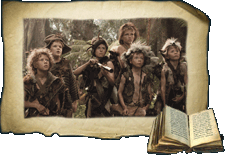
The creator of Peter Pan led a tragic and romantic life as a writer. This following article written by Vicky Hallet for US News analyzes how J.M. Barrie's life could have influenced the story of Peter Pan.
On Dec. 27, 1904, the curtain rose at the Duke of York's Theatre in London, and out popped a man in a dog costume, scrabbling about the stage with an occasional "Woof!" As the tale turned from a canine nanny to flying kiddies and dastardly pirates, the audience chortled and squealed and even clapped when they were asked to believe in fairies (although the orchestra was prepped to applaud should the theater fall silent).
Thus began the public career of the little boy who refused to grow up. Since then, Peter Pan has captured the imagination of generations, spawning feminist critiques, psychological treatises (who in the early '80s wasn't afflicted with "the Peter Pan syndrome?"), and even lawsuits: Last month, Peter and the Starcatchers, a prequel co-penned by humorist Dave Barry, set off a copyright dispute. And of course, there are the innumerable cinematic retellings, from Disney's animated 1953 classic to last year's live-action version. Now the story of Peter's creator, J. M. Barrie, is also the subject of a film, Finding Neverland, opening November 12 and starring Johnny Depp. "There are so many themes to explore--mortality, immortality, the transition from childhood to adulthood," says director Marc Forster.
Barrie's life "has all the elements of a Greek tragedy," says Andrew Birkin, author of J. M. Barrie and the Lost Boys: The Love Story That Gave Birth to Peter Pan. When he was just 6, his older brother, David, died in a skating accident. Attempts to cheer his grieving mother failed; the only thing that seemed to console her was that her dead son would be 13 forever. This concept of a ghost child, Birkin believes, was the root of Peter Pan. And although it was David who would always be a boy, Barrie took on the appearance of one, topping out by 17 at barely 5 feet tall. He was shy among classmates and even more so around women, but after leaving his home in Scotland to pursue a writing career in London, he soon found himself married--if unhappily--to Mary Ansell, an actress.
It was in London that Barrie first encountered two charming little boys and their nanny,
walking in Kensington Gardens. George and Jack were the sons of Sylvia and Arthur Llewelyn
Davies, and after meeting Sylvia at a dinner party in 1897, Barrie became a de facto member
of the family, which also included baby Peter. "In Peter Pan," says Birkin,
"Barrie writes that the Darlings could not have been a simpler family before the
coming of Peter, and the same could be said of the Davies family and Barrie."
To entertain George, a favorite, Barrie concocted tales about little Peter flying out
the window; the hero soon took on a new name, inspired by the lusty Greek god: Peter Pan.
Two more boys, Michael and Nico, were born later.
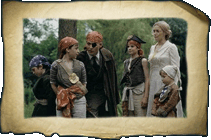 "I made Peter by rubbing the five of
you violently together," Barrie wrote, "as savages with two sticks produce a flame.
That is all he is, the spark I got from you."
"I made Peter by rubbing the five of
you violently together," Barrie wrote, "as savages with two sticks produce a flame.
That is all he is, the spark I got from you."
His adulation for young boys has certainly raised an eyebrow or two, but Birkin, who became friendly with Nico in the 1970s, says the youngest Davies son was certain Barrie's love was perfectly innocent. "Anyone less sexual would have been hard to imagine," Birkin says. Still, the simple years of make-believe games and fishing trips would come to an end soon after Peter Pan's debut. Two years later, Arthur died of cancer. The Barries divorced two years after that. A few months later, Sylvia also died of cancer, leaving the five boys in Barrie's care. The boys were mocked by other children because of the play; Peter began referring to it only as "that terrible masterpiece." Before long, World War I broke out, claiming George's life on the battlefields of France; Michael drowned at Oxford a few years later, in what was possibly a suicide.
J. T. Barbarese, Rutgers University assistant professor, assigns Barrie's novel as part of his children's literature course, and every year his students are shocked by the original text. "Disney wrung out all of the danger," he says. "We don't see that Peter kills pirates and then forgets about it or that when the island gets too crowded with lost boys, he thins them out." Barbarese's favorite adaptation is a 1987 vampire flick starring the two Coreys (Haim and Feldman). "The Lost Boys is a dead-on read of what Peter Pan represents. This kind of character is parasitic."